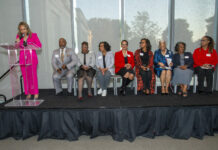Buford, LGBT Services director at the University of Louisville, plans to walk about 500 miles across northern Spain in June. He will follow El Camino de Santiago – an ancient spiritual pilgrimage route – from St. Jean Pied de Port, France, in the Pyrenee Mountains to the Cathedral of St. James in Santiago de Compostela, Spain.
He won’t stop there. He’ll go on to the town of Finesterre – the end of the Earth, some people thought 1,000 years ago when pilgrims first started walking the Camino.
UofL staff and faculty will go with him – in spirit at least. While he’s away from campus, many of his colleagues will be logging their own activities in support.
If this sounds familiar, it’s because Buford made a similar, but much longer, trek in 2007 and took his colleagues with him. That year, he walked the entire length of the Appalachian Trail (AT) – 2,180 miles from Georgia to Maine. The hike took six months to complete and while he was away, his UofL colleagues walked too, collectively logging enough miles to reach the moon.
As much as 80 percent of the people who set out to walk the entire AT quit before they achieve their goal.
“The odds were overwhelming, but the connection to the campus was the thing that helped me overcome them,” Buford said. “There were days when people were quitting left and right and I would have walked off if I didn’t have the thought in my head, ‘Oh, all those people back at UofL are cheering for me. I can’t let them down. I’m certainly not going to go back and say I quit, so I’d better get back out there’.”
Buford left his post in human resources to start the LGBT services office when he returned from the AT.
“It’s been a lot of hard work,” he said, “and I really need to recharge my batteries.”
Some people would do that by taking a couple of weeks off and heading to the beach with good books, but not Buford.
“This is just such a much more rich experience for me,” he explained. “I’ve known about this trail for a long time and I’ve always been intrigued with it. … It’s a pilgrimage … there is a part of it that is sort of contemplative, getting in touch with yourself again, and if you’re a person of faith, it’s about focusing on prayer… I’m interested in that, too. I’m not sure what that will be about for me.”
As he gets ready for his late-May departure, Buford said, his upcoming walk “feels very luxurious” when compared to his AT journey. That trip required him to do such things as carry his own food, sleep outdoors nearly every night and find sites with good water every day.
On the Camino, “you’re really walking from village to village having meals in town and sleeping in towns every night. Every little town on the Camino has a hostel, or albergue,” he explained.
“It’s a little bit less pressure than I felt trying to prepare and figure out how to do the AT. At the same time there are language barriers. I’m five years older than I was and I have not been hiking long distance in all those five years and it still requires walking 15 to 20 miles a day,” he said.
Back at UofL, Get Healthy Now won’t be asking that much distance from staff and faculty. Instead, GHN has planned a challenge that requires a minimum of 30 minutes of movement each day. While Buford gets his pilgrim passport stamped when he arrives at each town, staff and faculty also will have a passport they will get stamped for each 30 minutes of activity that they complete.
There will be a prize drawing each week with people being entered once for each stamp they receive, said Julia Mackenzie Rollinson, GHN fitness training coordinator who is organizing the challenge. GHN will have special events throughout the month – including group walks and a lunch and learn session with a former Camino pilgrim.
Buford’s colleagues can follow him online. He’ll periodically update a blog from the road.
“Recharging and … hiking for me are an important part of my life. And it’s so much fun to do. It’s so much fun to do the challenge with UofL, being disconnected but also staying in touch with a support system,” he said.

























